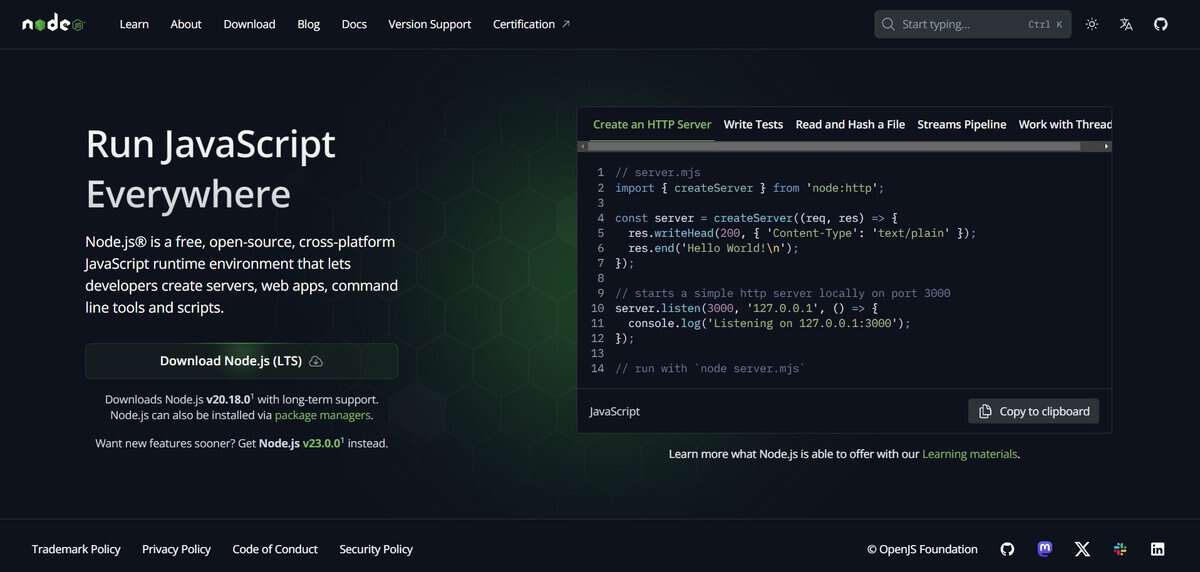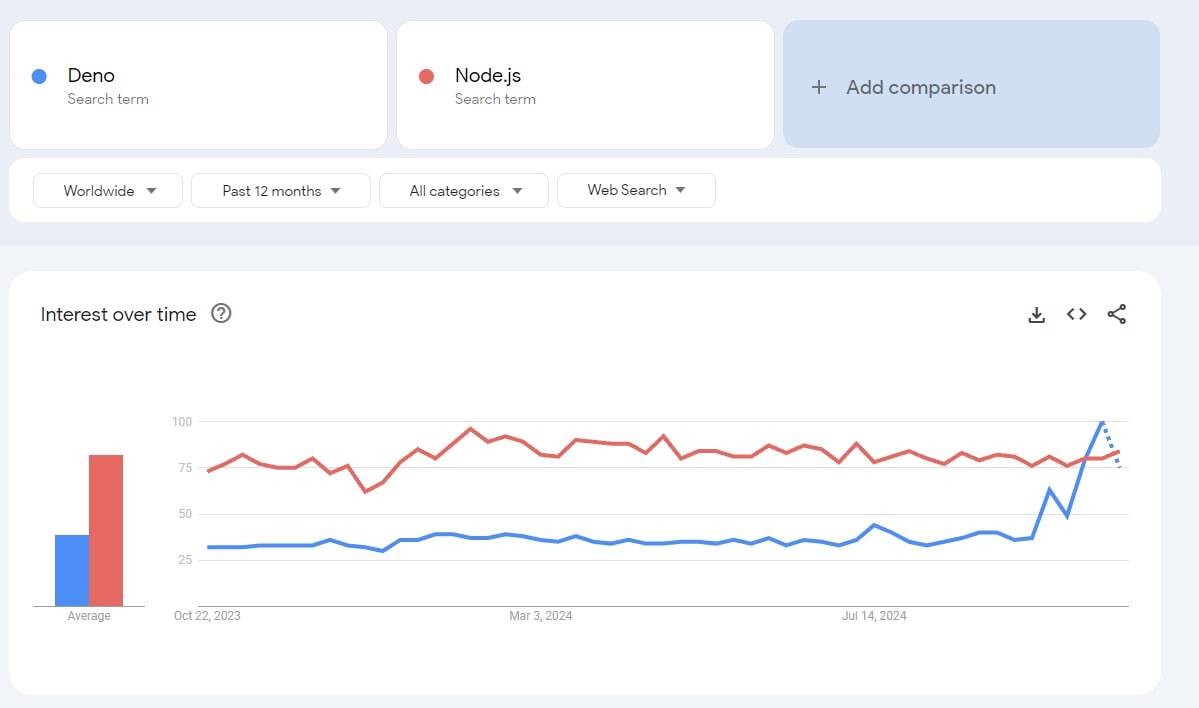


The rapid growth of web applications—from interactive social platforms and eCommerce systems to cloud-based productivity tools—has fundamentally transformed server-side development, pushing the boundaries of what’s possible in terms of performance and scale. As organizations tackle increasingly complex technical challenges, the Javascript ecosystem has emerged with two powerful solutions: the established Node.js platform and its modern challenger, Deno.
Node.js remains the undisputed leader in web development frameworks, with 40.8% of developers worldwide using it, according to 2024 statistics, running millions of websites through its mature ecosystem. Yet Deno, developed by Node.js creator Ryan Dahl and recently supercharged with its Version 2 release in October 2024, offers enhanced security and native TypeScript support as a modern alternative. As development teams plan their 2025 technology stacks, this analysis explores how these runtime environments compare across security, performance, and enterprise capabilities.

Node.js stands as a pivotal open-source, cross-platform Javascript runtime environment that executes code outside the traditional browser environment. Built on Google’s V8 engine, it revolutionized server-side development by enabling Javascript to run efficiently on servers. Since its inception in 2009, Node.js has become the backbone of modern web development, powering everything from real-time applications to REST APIs.
At its core, Node.js employs an event-driven, non-blocking I/O architecture that excels at handling concurrent requests with minimal resource consumption. This design makes it particularly effective for scalable, data-intensive applications. Its single-threaded event loop, combined with asynchronous processing capabilities, allows developers to build high-performance applications while maintaining code simplicity. The platform’s lightweight nature and extensive package ecosystem through NPM have cemented its position as the go-to solution for enterprise-level web development.

Deno is a modern, secure runtime environment for Javascript, Typescript, and Webassembly, created by Node’s founder, Ryan Dahl, in 2018 to address the limitations of his earlier platform. Built on the V8 engine and Rust, Deno prioritizes security with its permission-based system and offers native Typescript support out of the box. Distinguished by its secure defaults, built-in development tools, and commitment to web standards, Deno provides a single executable that requires no explicit file, network, or environment access unless specifically enabled.
The landmark release of Deno 2 in October 2024 has evolved the platform significantly, introducing seamless Node.js compatibility and enhanced npm integration. This major update allows developers to work with JSON packages and node modules while maintaining Deno’s streamlined approach to module management. The new version bridges the gap between traditional Node.js development and Deno’s modern features, making it a compelling choice for teams looking to leverage both ecosystems’ strengths in their server-side Javascript development.
| Category | Deno | Node.js |
|---|---|---|
| Language | Typescript, Javascript | Javascript |
| Packages | TS or JS modules | NPM |
| Security and Permissions | CLI Flags | No mechanisms |
| Code Engine | V8 Javascript | V8 Javascript |
| Security | Permissioned access | Full access |
| Browser Support | Support provided | Vague |
| Importing Packages | ES Modules | Common syntax |
| Community Support | Relatively new | Strong and huge |
| Async | Promises | Callbacks |
| Typescript Support | Built-in | Not built-in |
The core differences between Deno and Node.js reflect their distinct approaches to modern server-side Javascript development. While both utilize the V8 engine, Deno’s built-in Typescript support, permission-based security system, and URL-based module imports stand in stark contrast to Node.js’s traditional architecture. Deno eliminates the need for node modules and JSON packages by embracing direct URL imports, while its Rust-based backend and browser-compatible features, including window object support, demonstrate its modern design philosophy. These fundamental differences, coupled with Deno’s security-first approach, represent a significant evolution in Javascript runtime environments, though the recent Deno 2 release has bridged some gaps by introducing Node.js compatibility features.
The talent availability reflects the significant adoption gap between these technologies. According to StackOverflow’s 2024 survey, Node.js maintains a dominant position, with 40.8% of developers using it, while Deno currently holds a smaller market share at 1.9%. This stark difference in adoption rates directly impacts the available talent pool, though it’s worth noting that many Deno developers come from a Node.js background, which is particularly beneficial since Deno 2’s introduction of Node.js compatibility features.
In the rapidly evolving landscape of server-side Javascript development, choosing the right development partner is crucial for project success. DevsData LLC specializes in both Node.js and Deno implementations, offering comprehensive support services, including custom runtime development, security optimization, and seamless integration of both technologies. Their expert team provides advanced customizations, performance tuning, and migration services, helping businesses leverage the strengths of either runtime environment while ensuring optimal security and scalability. For instance, in the Wellbee project, DevsData LLC demonstrated its advanced Javascript ecosystem expertise by developing a sophisticated web application using Node.js. The project, completed in under a month, showcases the company’s ability to handle complex runtime environments and integrations. Their successful implementation of cross-system APIs, payment gateways, and cloud deployments on the Google Cloud Platform exemplifies their capability to build and optimize scalable Node.js applications for enterprise clients.
To help you determine which runtime best suits your project needs, let’s explore the key differences between Node.js and Deno across several critical aspects.
Deno and Node.js represent contrasting philosophies in package management. While Node.js relies on the established npm ecosystem with its centralized registry and node module structure, Deno takes a modern approach by enabling direct URL imports. This URL-based system eliminates the need for a package manager, though it introduces new security considerations. With Deno 2’s arrival, developers now enjoy the flexibility to use both approaches – maintaining direct URL imports while accessing the vast npm ecosystem when needed.
The API landscape showcases the evolution of JavaScript runtimes. Node.js’s legacy of callback-based patterns reflects its early Javascript roots, while Deno embraces modern Javascript features with native Promise support and async/await functionality. Deno’s commitment to web platform compatibility brings familiar browser APIs to the server side, including Fetch and Web Workers. This modern approach simplifies development workflows and reduces the learning curve for developers transitioning from frontend to backend development.
Security stands as a defining feature in Deno’s architecture, implementing a permission-based system that restricts access to system resources by default. Unlike Node.js’s unrestricted access model, Deno requires explicit permissions for file system operations, network requests, and environment variables. This security-first approach significantly reduces potential attack surfaces while maintaining development flexibility. The sandboxed environment ensures applications run with minimum necessary privileges, making it an attractive choice for security-conscious projects.
The developer experience between these platforms reflects their different ages and philosophies. Deno provides a modern, integrated development environment with built-in testing, formatting, and Typescript support out of the box. While Node.js offers a vast ecosystem of third-party tools and extensive community resources, Deno’s streamlined approach eliminates configuration overhead. This contrast presents developers with a choice between Node’s mature ecosystem and Deno’s modern, integrated toolchain.
When it comes to adoption, Node.js maintains a clear lead, having been embraced by a vast global community. Over the past year, it continues to be the most widely used technology, as reflected in search trends and developer surveys. For example, Google Trends consistently shows Node.js as the dominant search term compared to Deno, highlighting its sustained interest and relevance.

Screenshot from Google Trends
However, Deno is gradually gaining traction. While it is still far from overtaking Node.js, its modern and secure design has attracted developers seeking cutting-edge tools. This appeal is particularly strong among those who prioritize security and simplicity in their development workflows. Despite its smaller footprint, Deno’s momentum is growing, and it has positioned itself as a compelling alternative for developers looking for a more innovative approach.
Node.js continues to dominate developer preferences primarily due to its mature ecosystem and battle-tested reliability. Its vast npm registry, extensive community support, and widespread adoption in production environments make it a compelling choice for developers and organizations alike. The platform’s evolution over the years has created a robust foundation of resources, documentation, and third-party tools that significantly streamline development workflows.
While Deno offers modern features and addresses several of Node.js’s historical shortcomings, particularly in security and TypeScript support, the practical advantages of Node.js’s established ecosystem often outweigh these improvements. The familiarity of Node.js, coupled with its flexible permission system and extensive library support, makes it particularly attractive for dynamic projects requiring quick iterations and team collaboration. This preference isn’t merely about resistance to change; it’s a practical decision based on Node.js’s proven track record in production environments and its continued evolution to meet modern development needs.
Deno presents a compelling case for modern Javascript development with its built-in Typescript support, enhanced security features, and streamlined development experience. As an improved iteration of server-side Javascript runtime, it offers developers a more secure and efficient environment for building applications, particularly excelling in utility scripts traditionally written in Bash or Python. While it may not be ready to replace Node.js entirely, its modern standard library, direct URL-based package management, and all-in-one tooling make it an attractive option for new projects, especially those prioritizing security and modern development practices. As the platform continues to mature and expand its capabilities through tools like JSR, it becomes an increasingly viable choice for developers seeking a fresh approach to server-side Javascript development.
While Deno 2 represents a significant evolution in server-side Javascript development with impressive features like npm compatibility, improved package management, and the new Javascript Registry (JSR), it’s unlikely to replace Node.js in 2025. The vast ecosystem and established presence of Node.js in production environments over the past decade continue to make it the dominant platform for server-side Javascript development.
Deno 2 now works with existing Node.js code, showing a change in strategy—instead of trying to replace Node.js completely, Deno aims to work alongside it. This new approach, combined with features like native Typescript support, enhanced security, and a stable standard library, positions Deno as a complementary technology rather than a replacement. The platform’s ability to work seamlessly with existing Node.js projects while offering modern development capabilities makes it an attractive option for developers looking to gradually transition or experiment with new projects.
However, the key to understanding Deno’s future lies in its mission to simplify Javascript development rather than overthrow Node.js. With its Long Term Support (LTS) program, improved package management system, and focus on developer experience, Deno is carving out its own niche in the Javascript ecosystem. While we can expect to see increased adoption of Deno, particularly in new projects and organizations prioritizing security and modern development practices, Node.js will likely maintain its position as the dominant server-side Javascript runtime through 2025 and beyond.
| Platform | Pros | Cons |
|---|---|---|
| Node.js |
|
|
| Deno |
|
|
When choosing between Node.js and Deno, it’s essential to consider your project requirements, team expertise, and development goals. Node.js remains the go-to choice for enterprise-level applications requiring extensive third-party integrations and mature community support, while Deno shines in projects prioritizing security, Typescript integration, and modern development practices. Your decision will largely depend on factors such as application scale, security requirements, and team familiarity with the ecosystem. While Node.js currently dominates the market, Deno’s growing compatibility and enhanced features suggest it could become an increasingly viable alternative.
As a premier software development and IT recruitment managing a talent pool of over 65000 verified IT professionals, DevsData LLC stands at the forefront of helping companies build elite development teams for Node.js and Deno projects. The company’s proven track record in delivering sophisticated backend solutions and enterprise-level systems positions them as trusted advisors in selecting and deploying optimal runtime environments. Through rigorous execution of over 100 cross-industry projects, DevsData LLC has earned flawless 5-star ratings from both Clutch and GoodFirms. Glowing client testimonials reinforce their reputation for delivering exceptional results.
In the evolving landscape of server-side Javascript, organizations need different expertise, varying from Node.js veterans capable of handling complex enterprise deployments to forward-thinking Deno specialists who prioritize security and modern architecture. DevsData LLC excels at matching these specific needs with precisely qualified talent, employing a meticulous screening process that evaluates both hands-on programming capabilities and the strategic insight needed to navigate runtime environment decisions effectively.
DevsData LLC’s team of experienced consultants can provide end-to-end support for your server-side JavaScript projects, offering technical consulting and custom development services for both Node.js and Deno implementations. With offices across major tech hubs, including New York, London, and Warsaw, they deliver high-quality solutions tailored to your specific technical requirements and business goals.
Ready to explore your Node.js or Deno development options? Reach out to DevsData LLC at general@devsdata.com or visit the website at www.devsdata.com for expert guidance in choosing and implementing the ideal server-side Javascript solution for your upcoming project.
Frequently asked questions (FAQ)
DevsData – your premium technology partner
DevsData is a boutique tech recruitment and software agency. Develop your software project with veteran engineers or scale up an in-house tech team of developers with relevant industry experience.
Free consultation with a software expert
🎧 Schedule a meeting
FEATURED IN


DevsData LLC is truly exceptional – their backend developers are some of the best I’ve ever worked with.”
Nicholas Johnson
Mentor at YC, serial entrepreneur


 Build your project with our veteran developers
Build your project with our veteran developers
 Explore the benefits of technology recruitment and tailor-made software
Explore the benefits of technology recruitment and tailor-made software
 Learn how to source skilled and experienced software developers
Learn how to source skilled and experienced software developers




Categories: Big data, data analytics | Software and technology | IT recruitment blog | IT in Poland | Content hub (blog)
